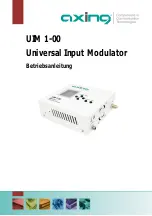
74
Alphabetical Listing
fMax()
Catalog >
fMax(
Expr
,
Var
) |
lowBound
≤
Var
≤
upBound
Returns a Boolean expression specifying
candidate values of
Var
that maximize
Expr
or locate its least upper bound.
You can use the constraint (“|”) operator to
restrict the solution interval and/or specify
other constraints.
For the Approximate setting of the
Auto or
Approximate
mode,
fMax()
iteratively
searches for one approximate local
maximum. This is often faster, particularly
if you use the “|” operator to constrain the
search to a relatively small interval that
contains exactly one local maximum.
Note:
See also
fMin()
and
max()
.
fMin()
Catalog >
fMin(
Expr, Var
)
⇒
Boolean expression
fMin(
Expr
,
Var
,
lowBound
)
fMin(
Expr
,
Var
,
lowBound
,
upBound
)
fMin(
Expr
,
Var
) |
lowBound
≤
Var
≤
upBound
Returns a Boolean expression specifying
candidate values of
Var
that minimize
Expr
or locate its greatest lower bound.
You can use the constraint (“|”) operator to
restrict the solution interval and/or specify
other constraints.
For the Approximate setting of the
Auto or
Approximate
mode,
fMin()
iteratively
searches for one approximate local
minimum. This is often faster, particularly
if you use the “|” operator to constrain the
search to a relatively small interval that
contains exactly one local minimum.
Note:
See also
fMax()
and
min()
.
Summary of Contents for TI-Nspire CAS
Page 4: ...4 Service and Warranty Information 249 Index 251 ...
Page 248: ...248 ...
Page 250: ...250 ...














































